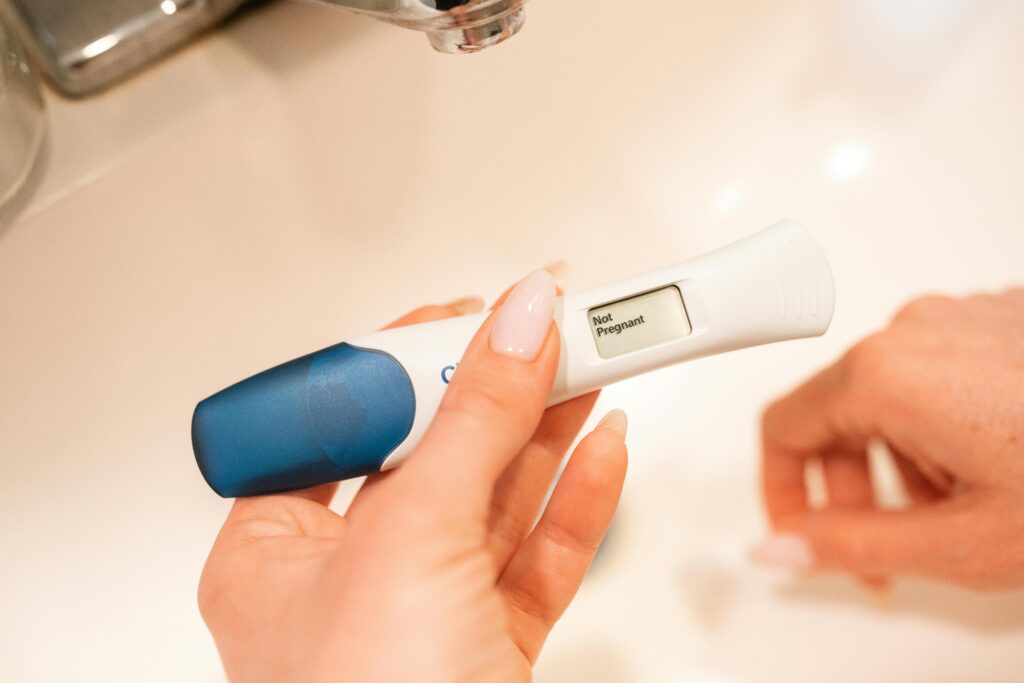
Basic female reproduction tells us that conception is most likely during ovulation. Women can estimate their most fertile days by performing a simple calculation. For the majority of women, ovulation occurs at the midpoint of their menstrual cycle. If you are trying to conceive and have regular menstrual cycles, this is the best time for unprotected intercourse.
What is A Menstrual Cycle
Your menstrual cycle begins on the first day of your period and lasts until the beginning of your next period. During that time, you shed the uterine lining that prepared for implantation, then, usually within a few weeks, your ovaries release an egg, and the uterine lining grows in anticipation of a fertilized egg, resulting in an embryo which implants in your uterus. If fertilization doesn’t happen, you start your period, beginning the cycle once more.
According to doctors, the “normal” menstrual cycle runs between 24-35 days, with 28 days being common. However, everyone’s cycle isn’t the same. Some women experience irregular periods and have only a vague idea of ovulation. Some go months with no period. And some have regular every-28-day cycles for a time, then skip one or two for no apparent reason. That makes predicting ovulation extremely difficult which in turn, makes trying to conceive truly frustrating.
Knowing Your Body
Paying attention to your body and all its little twinges and subtleties is a good way to know when something is going on. And so it is with ovulation. Pay close attention, and you’ll know when you’re about to ovulate. Here are some signs that ovulation is imminent:
- Change in cervical mucus: As ovulation nears your vaginal discharge changes and becomes more pronounced. It becomes noticeably wetter, slippery, and resembles raw egg whites.
- Temperature changes: Your resting temperature, also called your basal body temperature, dips just before ovulation, then rises (sometimes a whole degree) immediately after ovulation occurs. Your temperature may remain slightly elevated for a few days. This is the optimum time to conceive.
- Mild pelvic pain: Mittelschmerz, or middle pain in German, is the medical term for the pain some women experience during ovulation. This pain ranges from mild cramping to sharp pain. The pain lasts from a few hours to a day or two. If the pain seems to last longer than that or intensifies, please reach out to your doctor.
- Increased libido: Many women find their sex drive increases during ovulation. The reason behind this heightened sex drive (libido)? An increase in estrogen, which is a main player in sexual arousal. You may also experience breast tenderness, bloating, increased appetite, and mood changes.
Calculating Your Menstrual Cycle to Determine Ovulation
By pinpointing ovulation with extreme accuracy, you increase your odds of conception. The most proven way to accurately determine ovulation is by tracking your menstrual cycle. You may choose to do this using a calendar or an online tracking tool.
For those who experience irregular periods, it may take a while to establish ovulation based on a calendar or tracking app. Fertility clinics in LA often recommend ovulation predictor kits. Just prior to ovulation, there is a surge in your LH (luteinizing hormone). The ovulation predictor kits detect the surge and determine your most fertile days. These kits work well for those with irregular periods, as you may begin testing as soon as your period ends.
However, scheduling an appointment with your doctor is the surest way to predict ovulation and get to the bottom of your irregular periods. Irregular periods may indicate some ovulatory dysfunction. The cause may be hormonal, a preexisting health condition like PCOS, an issue with egg quality, diminished ovarian reserve, or an issue affecting your uterine lining, for example.
For those women who experience very few or no periods at all, a condition known as secondary amenorrhea, seeing a doctor is crucial. There may be several causes a woman ceases menstruating, including a hereditary condition, certain medications, eating disorders, being underweight, over-exercising, and underlying medical conditions such as thyroid disorder.
But the bottom line is you cannot get pregnant if you aren’t ovulating. Please see your physician if:
- You’ve missed a period and are not pregnant
- You experience irregular periods but haven’t had one in three months
Overcoming the Obstacle to Pregnancy
While the term “ovulatory dysfunction” applies to many conditions that cause irregularities or absence of ovulation, problems with ovulation contribute to infertility. At our IVF centers in the greater Los Angeles area, LA IVF, we offer solutions for overcoming the obstacles that stand in the way of your dream of growing your family.
Egg-freezing is a popular solution for those who suffer from ovulation disorders stemming from conditions such as PCOS, endometriosis, or who are at risk for diminished ovarian reserve. Although IVF success following egg-freezing is greater for women under the age of 35, older women with viable eggs may opt for preserving their fertility this way as well.
Other ways to overcome ovulation issues are hormonal medications, treatment for underlying conditions, intrauterine insemination (IUI), IVF, and donor eggs. But the first step for those who are trying to conceive without success is a medical evaluation.
For more information on calculating your menstrual cycle, egg-freezing, IVF, IUI, or any concerns regarding your fertility, please reach out to LA IVF for a consultation with our team of fertility specialists.




